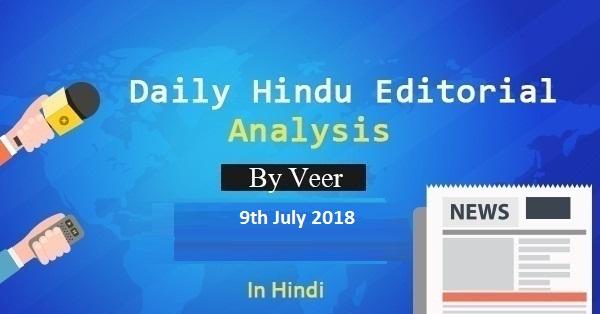Table of Contents
No one wins
The U.S.-China trade war is on; unless saner counsel prevails, it will affect others too
Official beginning of what China dubs as “the biggest trade war in economic history
Potential to cause some significant damage to the world economy.
U.S. President Donald Trump, who began the year by imposing tariffs on imported solar
panels and washing machines, has vowed to possibly tax all Chinese imports into the U.S
“America First” campaign
China, not surprisingly, has responded by targeting American exports like soybean
and automobiles- could cause job losses in American
Other major U.S. trading partners such as the European Union, Mexico, and Canada
have also slapped retaliatory tariffs on various U.S. goods.
In a globalised world, no country can hope to impose tariffs without affecting its own
economic interests.
U.S. and China, which have blamed each other for the ongoing trade war, are doing
no good to their own economic
Due to the trade war is already affecting private investment in the U.S., with many
investors deciding to scale back or delay their investment plans
China, which is fighting an economic slowdown, will be equally affected
It could also isolate the U.S.- Refused to settle differences through serious negotiations
11 Asia-Pacific countries went ahead to sign a trans-Pacific trade deal while leaving out
the U.S., which had pulled out of the Trans-Pacific Partnership in early 2017
World economy, which is on a slow path to recovery, can do without such unnecessary shocks


The tree as an urban coordinate
Ongoing protests in some of India‟s largest cities (these include Delhi and Mumbai)
to save natural.
Hundreds of Delhi residents took to the streets in protest against a plan to have 14,000 trees
cut for the “redevelopment” of government colonies in South Delhi.
Mumbai, citizens have been fighting for years to save over 2,000 trees to make way
for a metro line car shed
It is well known that forests are invaluable as ecological entities
In India, forests are governed under the Forest (Conservation) Act, 1980, State laws, and
the Indian Forest Act, 1927,
Which lay down elaborate rules for the conservation and diversion of forests
Despite this, forests are the first targets when it comes to projects such as mining, dams,
highways, industrial projects and so on, to be offset by compensatory afforestation
As India moves towards more urbanisation, can cities be looked at more as shared habitats –
humans and biodiversity
Delhi is a tough city to live in- Trees in Delhi do not just purify air; they are also visual relief.
Thus the fight for Delhi‟s trees is also a fight for the right kind of species to be allowed
to grow to the right size
A tale of two economies
By next summer, U.S. President Donald Trump could claim to have beaten the 10-year growth
period of 1991 to 2001.
Cutting interest rates, injecting billions of dollars into the economy, cleansing the financial sy
stem so that banks can resume lending, tax cuts by the Barack Obama administration,
and spending increases helped the U.S. economy recover
U.S. Federal Reserve has the difficult task of raising interest rates
Brexit troubles- In the U.K., the situation is worse.
Leaving the European Union (EU) means getting into uncharted waters
EU businesses have cut back(कटौती) on their investment since Britain decided to leave the EU
Border problem between the Irish Republic and Northern Ireland
Leaving the EU will affect Britain in many ways. It will be excluded from the EU space
project Galileo, and lose access to the EU global positioning system that will challenge the
American GPS as a market leader.
It will lose EU funding for scientific research.
Britain will also lose its place as a leading country in the EU‟s customs union.
Both the U.S. and the U.K. have reason to regard India‟s economic prospects and political
stability with some envy.

Discriminatory practice
There is a gap between the mandated reservation percentage for disabled persons and the
actual numbers
Reports suggest that Jawaharlal Nehru University may have been in violation of
disability reservation provisions in student selection and faculty recruitment
Parliament passing the Rights of Persons with Disabilities (RPwD) Bill and enacting it as a
law in 2016.
On paper, the RPwD Act appears commendable as it has increased quota of reservation for
persons with benchmark disabilities from 3% to 4% in government jobs and from 3% to 5%
in higher educational institutions
Since the Act came into force, there have been multiple instances of persons with disabilities
having to fight their cases in courts
The argument often given by authorities is that due to the paucity of seats
State governments have been in violation of the prior Persons with Disabilities Act of 1995 an
d of the RPwD Act, 2016
Prelims Focus Facts-News Analysis
Page-1- 9 parties oppose proposal for simultaneous elections
Four parties support move; BJP, Congress stay away from consultations

Page-1- Four Thai boys rescued on „D-day‟ of tunnel operation
Four boys among a group of 13 trapped in a flooded Thai cave for more than a fortnight were
rescued on Sunday, authorities said

Page-1- Fish samples test positive for formalin(CH₂O)
Tamil Nadu govt promises action against those using carcinogen(potential to cause cancer)

Prelims Focus Facts-News Analysis
Kerala government will introduce a mobile app to help transgenders
App will be named- „Mazhavillu‟ after the comprehensive project for transgender community
Six bids to supply 110 fighters for IAF
F-16, Gripen, Boeing F-18, Rafale, Eurofighter Typhoon and MiG-35 enter the contest


Last Day- Q’s- Answers…
Journalist Shujaat Bukhari: Editor of “Rising Kashmir”
Commission for Agricultural Costs and Prices: Under “Ministry of Agriculture and Farmers
Welfare(minister: Radha Mohan Singh)”- formed: January 8 ,1965
Attorney General of India: Article 76- Highest Law officer in the country.





















 WhatsApp
WhatsApp